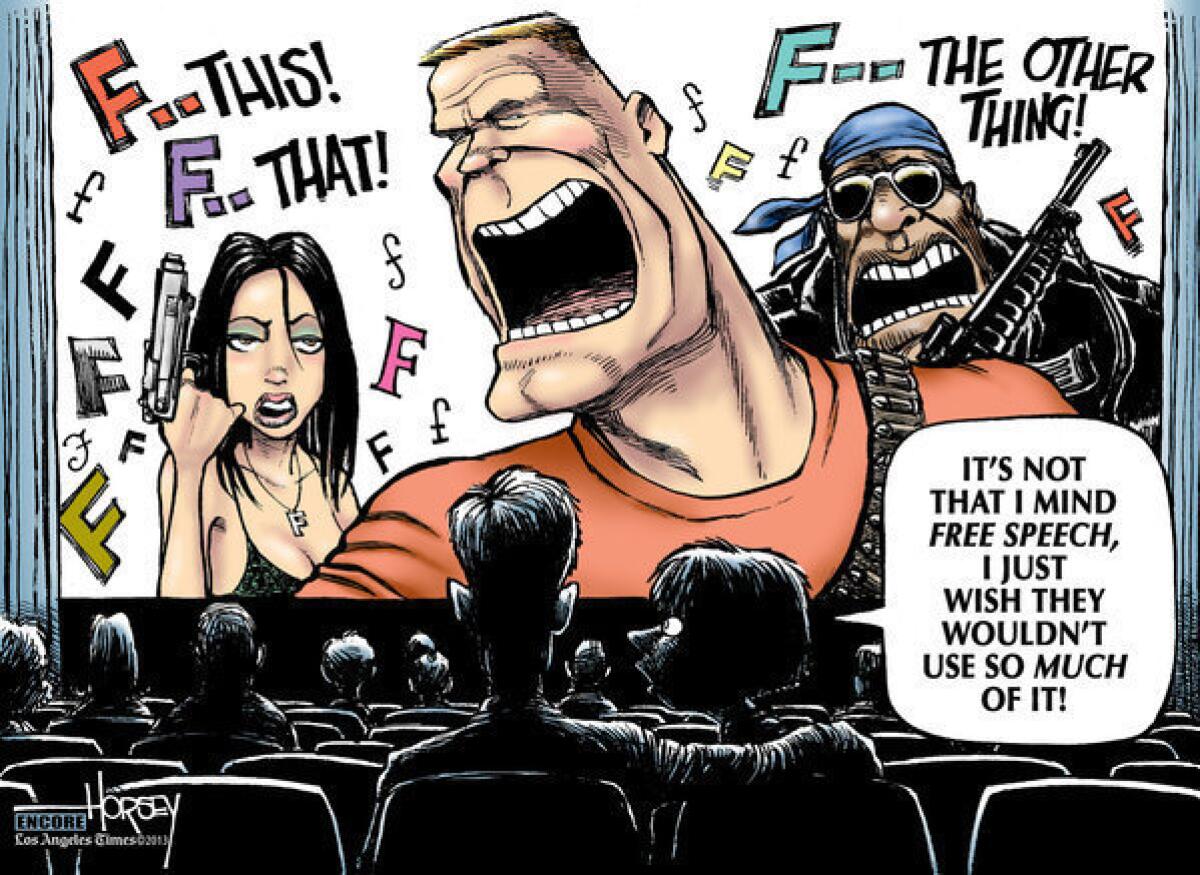The F-word gets a starring role in Hollywood

- Share via
When audiences first heard Clark Gable utter the line, “Frankly, my dear, I don’t give a damn,” in the 1939 premiere of “Gone With the Wind,” they were shocked and amazed that the D-word got past the censors. Such a reaction seems quaint in today’s entertainment world, where the F-word reigns supreme.
Once the most forbidden of curse words, the F-word is now ubiquitous. It is the lightly bleeped expletive put to constant use by Jon Stewart and the comic newsmen on “The Daily Show.” HBO built itself into a cable TV behemoth partly on the impact of that four-letter word unleashed in several great series, from “The Sopranos” to “Deadwood.” The characters in Seth Rogen and Judd Apatow’s raunchy and hugely successful comedies would hardly be able to speak if they were not allowed to drop a steady stream of F-bombs.
The F-word has been brought out of the closet and now is a script staple in the majority of movies and cable television shows. On balance, that is a good thing. It was crazy to cleanse from the vocabulary of artists certain words that were common in the daily lives of those who bought the tickets to the movies – as crazy as insisting that married couples in films and TV shows sleep in separate beds.
But artistic license needs to be paired with artistic sensibility. When use of the F-word was rare, it had impact when uttered onscreen. Now, overuse has made it mundane. In the hands of mediocre screenwriters, one of the most versatile words in the English language has become a crutch to get cheap laughs or an easy imitation of grittiness.
Maybe the average young screenwriter in Hollywood utters the F-word in every other sentence, but not everyone does. When a script has everyone from a street punk to a little girl to a grandmother speaking in the same expletive-driven language, it does not create verisimilitude, it is just bad writing.
Years ago, a friend and I were wandering the narrow passageways of the medina in Marrakech. A young Moroccan kept pestering my friend, insisting on being paid as a guide through the labyrinthine marketplace. My friend politely kept saying no. In youthful pique, I finally confronted the Moroccan and said, “My friend keeps telling you no. Do you understand what the word ‘no’ means?” Angrily, the Moroccan said, “Yes, I know what ‘no’ means!” So, then, as if it were a movie, I asked him if he knew what a certain usage of the F-word meant. Apparently he did, since he kept shouting it at us as he continued to follow us.
My injection of the F-word into the exchange certainly added drama to the moment, but, as I contemplated how we actually were lost and how this guy might have a gang of friends with knives lurking nearby and how those friends might also find my use of the word a wee bit offensive, I began to wish I had employed a less provocative figure of speech.
The lesson being: the F-word is potent and powerful; think twice before you use it too much.
ALSO:
Horsey on Hollywood: Oscar’s summer holiday
Horsey on Hollywood: “The Expendables”
Horsey on Hollywood: Kashing in With the Kardashians
President Obama puts himself on Kardashian enemies’ list
Horsey on Hollywood: A look at some summer blockbusters
MORE
PHOTOS: Highest-paid media executives of 2012
ON LOCATION: People and places behind what’s onscreen
PHOTOS: Celebrity production companies
More to Read
From the Oscars to the Emmys.
Get the Envelope newsletter for exclusive awards season coverage, behind-the-scenes stories from the Envelope podcast and columnist Glenn Whipp’s must-read analysis.
You may occasionally receive promotional content from the Los Angeles Times.








